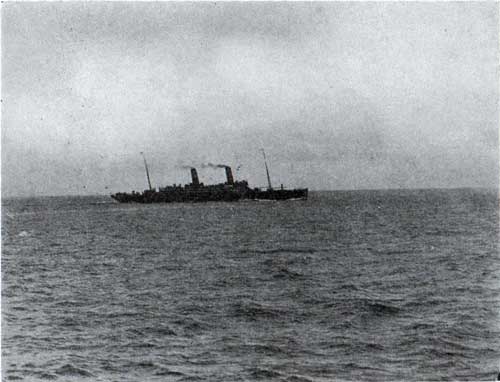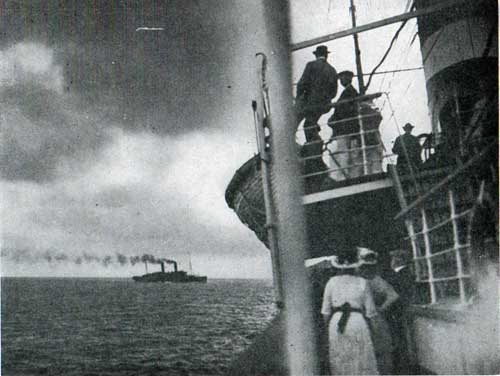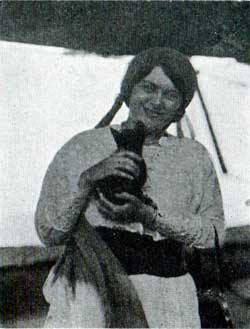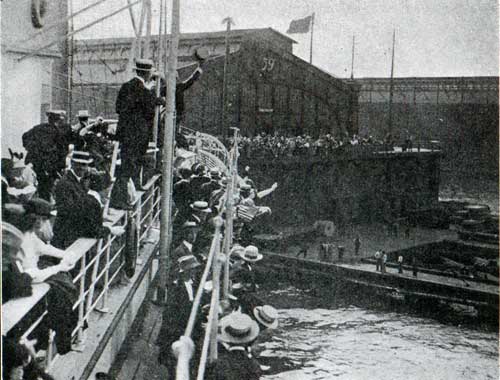Contact with a British War Ship and Arriving In New York - Unofficial Log of the Sailing of a Refugee Ship in 1914
Our first contact with the war after we had left Genoa happened at Gibraltar, the third evening out. The sun had just gone down behind the historic rock, and the soft darkness of twilight was beginning to cast a haze over its sharp outlines when of a sudden, a small torpedo boat destroyer speeded towards us from the shadows. Since Dr. Butler had prepared for such an incident before weighing anchor by obtaining permission through the kindness of Winston Churchill, First Lord of the Admiralty, to pass Gibraltar, and since the American flag was at the peak, we felt pretty sure that we would not be delayed. Yet it caused a thrill to see the little belligerent vessel approach with the swiftness of a greyhound.
When it had come alongside, one of the Englishmen flashed the white beam of a powerful searchlight first at our colors and then at our decks crowded with passengers who had turned out to see the King's fighting ship.
The English officer in command called the customary, "Where are you from and where bound?" and upon receiving the reply, "From Genoa to New York, carrying American citizens," he ordered the inquisitive ray turned off, and then, with a final "Thank you", directed his little craft back to the protecting rock. A lusty cheer from four hundred American throats followed his vessel across the water.
Our other experience with a man-o-war happened some seven hundred miles off the coast of New York on Friday, the twenty-first. About five o'clock in the afternoon, we received a wireless message from a ship far down on the starboard quarter behind us.
J "To I. Y. U.," it called, (I. Y. U. is the wireless name for the Principe di Udine) "Stop your ship by order of our commander. Tell your captain to stop his engines and await us."
Our operator, Signor Amici, asked, "Please give your name."
"We are an English warship," came the reply.
Then Signore Amici answered for Captain Tiscornia, "Your message received. Our engines are stopped."

The English Auxiliary Cruiser
The other continued, "To I. Y. U.: Please tell us from what port you sailed, where you are bound, what cargo you have, and how many passengers."
We replied, "To English warship: From Genoa to New York. Little general merchandise. 399 passengers, American citizens. Vessel chartered by American Consul General."
Then came the response, "You may proceed. Sorry to have delayed you. Wish you pleasant voyage."

Watching the Cruiser Pass
While this conversation was going on, the black hull and smoking funnels grew larger and larger as the vessel approached us, churning white foam in the indigo sea.
When the ship drew near, the excitement on the Udine became intense; passengers crowded even high up on the life-boats in order to get an unobstructed view of His Majesty's man-o-war. Our vessel, with flags flying from every mast and with hundreds of passengers lining the rails, must have presented a brilliant spectacle to the Britishers; and certainly, the auxiliary cruiser made an interesting sight to us as she steamed past. With binoculars, we could make out her formidable guns, and even the red and white of the ensigns floating at her tops.
Ever since the two vessels had reached signaling distance, their captains had been supplementing the wireless conversation with International Code communication. Our excited Italian sailors hoisted string after string of parti-colored flags in response to the questioning banners flying from the English halyards, until the captain of the cruiser gave us the word to proceed.

While the black vessel was drawing away, we suddenly ran into a shower, whose approach had been unnoticed in the excitement of watching the cruiser. It blew over in a moment, however; and then, as if to announce that our war experiences were finally ended, a beautiful rainbow appeared. After seeing this good omen, we felt that we should have no more "refugee" troubles. Memories of trials on the Continent quickly receded before thoughts of America, and conversations about the arrival in New York took precedence over all others during the rest of the voyage.
On Sunday, the formal farewells between the captain and his ship's company presaged the ending of the voyage. Captain Tiscornia's after dinner toast that evening very fittingly conveys an idea of the careful courtesy he extended to his passengers on this unique trip. He said:
"Ladies and Gentlemen:
"The friendship which has existed for so many years between your country and mine makes it most appropriate that you should be returning home upon an Italian ship.
"Italy rejoices to be of service to Americans as America has always rejoiced to serve Italians in their need. If I have been so fortunate as to have helped you on your way, I am more than repaid by your friendship, which I assure you, I can never forget.
"May this voyage of the Principe di Udine serve to bind our countries more closely together.
"I drink to the health and happiness of the United States and Italy."
Thus endeth the Unofficial Log of the eventful voyage of the Principe di Udine. Because of limitations of space, many interesting events have not been recorded. No mention has been made of the stony Balearics, the green Azores, the flying fish that disported themselves during the early morning hours, the leaping dolphins, nor of a hundred other incidents we all remember; but the omissions must be forgiven, for the Log is but unofficial after all.

Arriving in New York
